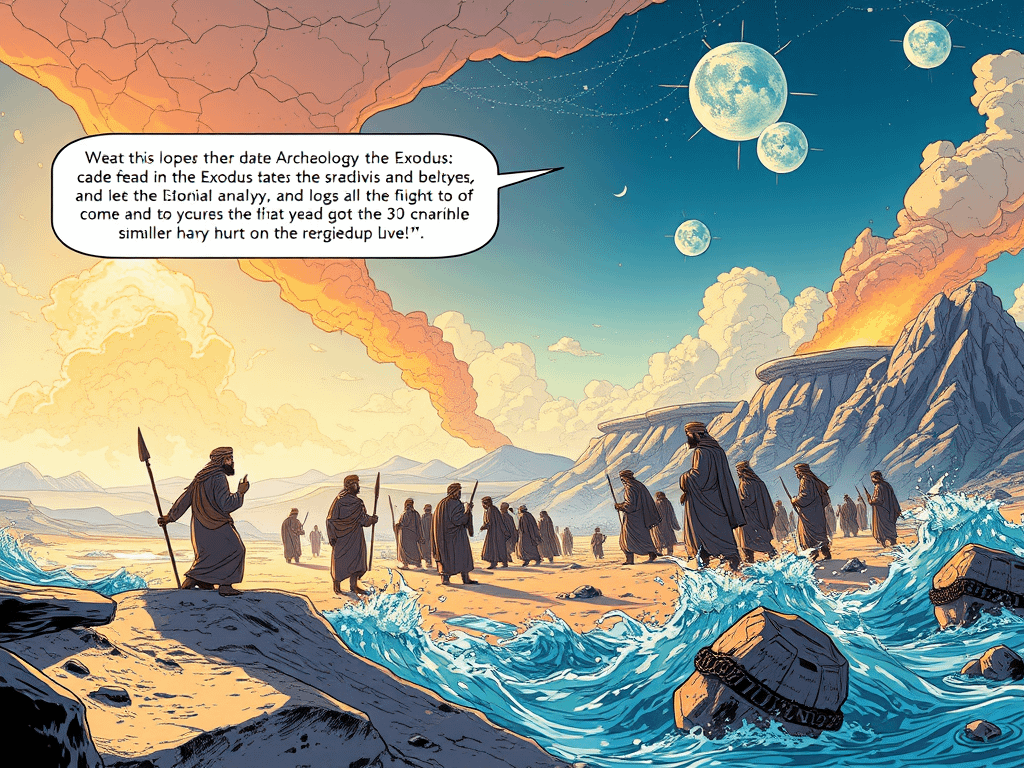Biblical Exodus Uncovered: The Miracles That Cemented Our Faith
Biblical Exodus Uncovered: How can a story from over 3,000 years ago still capture the imagination and intrigue of modern scholars and theologians today?
This question underpins the ongoing fascination with the Biblical Exodus, a narrative pivotal not only to Jewish history but also to Christian and Islamic traditions.
According to the biblical account, the Exodus describes how the Israelites, led by Moses, escaped slavery in Egypt, traversed the desert, and eventually reached the Promised Land.
Yet the historical authenticity of these events remains elusive, sparking debates among historians, archaeologists, and theologians.
This article delves into the saga of the Biblical Exodus, navigating through the accounts, theories, and the relentless quest for historical validation.
The Narrative of Exodus
The story of the Exodus is one of the most revered in the Bible, positioned as foundational to Jewish identity and faith.
It describes how the Israelites were enslaved in Egypt and freed by divine intervention. This epic journey, led by Moses, involved confronting Pharaoh, enduring ten plagues, and a dramatic crossing of the Red Sea.
The Israelites wandered the desert for 40 years before reaching the land promised to their forefathers, Canaan.
This narrative is not only a spiritual testament but also a quest for freedom and identity that resonates across cultures.
| Section | Event | Significance |
|---|---|---|
| Slavery in Egypt | Enslavement of Israelites | Represents oppression |
| Ten Plagues | Divine Punishments | God’s intervention |
| Red Sea Crossing | Escape from Pharaoh | Miraculous deliverance |
| Desert Wandering | 40 Years Journey | Test of faith and endurance |

Historical Evidences and Challenges
For decades, scholars have attempted to validate the Exodus story through historical evidence and archaeological findings.
The challenge lies in the sparsity of material evidence directly correlating with the Exodus events described in the Bible.
Ancient Egyptian records make no mention of the Israelites or a mass exodus from Egypt, prompting some historians to question the historical accuracy of the biblical account.
Despite exhaustive studies, no concrete evidence, such as inscriptions or artifacts, has been uncovered to corroborate the biblical narrative precisely, making it a profound mystery of antiquity.
The Role of Archaeology
Archaeologists play a crucial role in the search for historical evidence of the Exodus. Excavations in Egypt and along supposed routes of the Exodus have yielded limited success.
Discoveries such as remnants of settlements and artifacts provide insights into ancient civilizations but not direct proof of the Exodus journey.
The blend of scientific rigor and conjecture continues to fuel the debate, keeping the search alive. Some scholars posit that evidence might be found in alternative locations, or that the story is an allegorical representation rather than a historical record.
“The Exodus is the founding myth of Israel; what Egyptian evidence can prove or disprove about it?” – Anonymous Scholar
Theological Interpretations
Theological perspectives offer a different lens through which the Exodus story is viewed. Many theologians assert that the story’s spiritual and moral teachings surpass the need for historical validation.
The Exodus is seen as a powerful metaphor for liberation, faith, and divine deliverance, aspects that carry profound theological weight.
This symbolic interpretation suggests that the true significance of the Exodus lies in its impact on religious consciousness rather than empirical evidence.
Cultural Impact and Legacy
Beyond theology and history, the Exodus story has left an indelible mark on culture and society. It has been retold through literature, film, music, and art, each medium capturing the essence of human struggle and divine intervention.
The narrative’s themes of freedom from oppression and the journey to a promised land have universal appeal, inspiring movements for social justice and liberty throughout history. The Exodus has become a cultural touchstone, resonating in diverse settings worldwide.
Comparative Narratives in Ancient Cultures
Intriguingly, narratives similar to the Exodus appear in other ancient cultures. Stories of mass migrations and divine deliverance echo in the annals of Babylonian, Greek, and other Middle Eastern civilizations.
These parallels invite questions about shared human experiences and the transmission of oral traditions across geography and time.
Comparative mythology thus enriches the discussion, suggesting a tapestry of interconnected tales reflective of human history and spirituality.
Interpretations in Modern Research
Modern research continues to delve into the Exodus story, employing advanced methodologies to explore its plausibility.
Scholars utilize interdisciplinary approaches, merging archaeology, textual analysis, and digital modeling to reconstruct possible historical scenarios.
This evolving academic landscape fosters a dynamic discourse, broadening the understanding of a narrative that has persisted for millennia.
As technology advances, so does the potential to unravel the mysteries surrounding the Exodus.
1-The interplay between historical evidence and religious narrative invigorates scholarly exploration, highlighting the complexities inherent in studying ancient texts.
2-Some theories suggest a smaller-scale migration event, possibly reflected in a mythologized biblical account, bridging a gap between faith and empirical evidence.
3-Researchers explore natural phenomena, like volcanic eruptions or floods, as potential inspirations for miraculous elements like the parting of the Red Sea.
4-The Exodus story serves as a case study for understanding how historical events transform into cultural myths, a process integral to the shaping of collective memory.

Conclusion
The story of the Biblical Exodus continues to captivate and challenge, straddling the domains of history, theology, and culture.
Its enduring legacy underscores the complexities of interpreting ancient texts and the interplay between myth and reality.
While concrete evidence remains elusive, the narrative’s profound moral and spiritual lessons perpetuate its relevance across generations.
The Exodus, whether viewed through a historical or allegorical lens, remains a testament to the resilience and faith intrinsic to the human spirit.
FAQ – Dúvidas Comuns
What is the significance of the Exodus narrative in religious contexts?
The Exodus represents liberation and serves as a foundational myth in Judaism, with significant theological implications in Christianity and Islam.
Why is there limited archaeological evidence supporting the Exodus?
The absence of direct evidence might be attributed to the passage of time, the nature of ancient record-keeping, and potential misidentification of archaeological sites.
What role does comparative mythology play in understanding the Exodus?
Comparative mythology examines parallels with other ancient narratives, offering perspectives on shared cultural and human experiences.
How do modern technologies contribute to the research on the Exodus?
Technologies like digital archaeology and textual analysis aid in reconstructing historical events and opening new avenues for academic inquiry.
Is the Exodus story considered purely allegorical by modern scholars?
Opinions vary; some view it as a symbolic narrative, while others believe it may have a historical core amid mythological embellishments.







